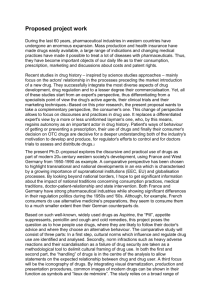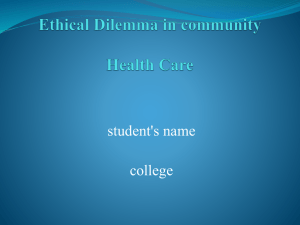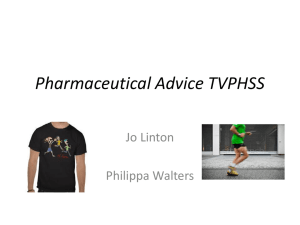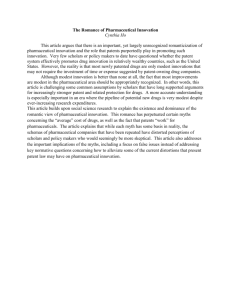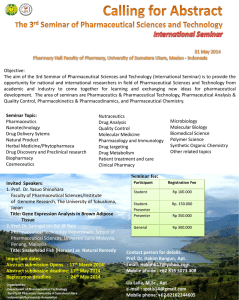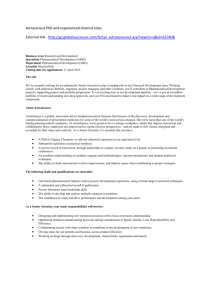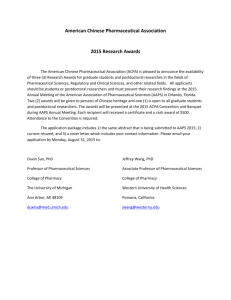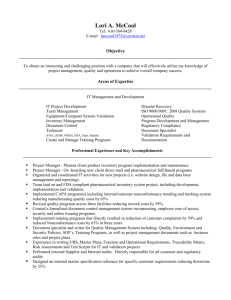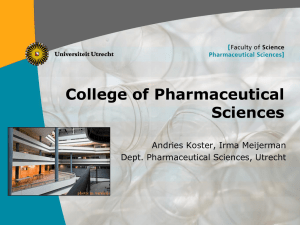File
advertisement
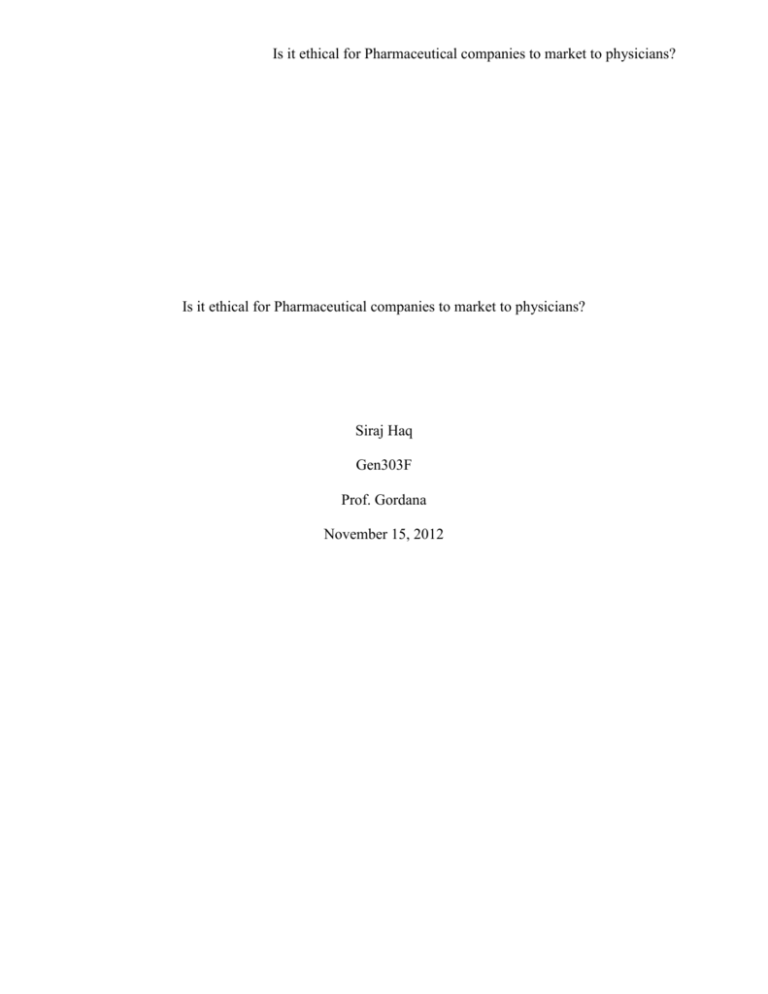
Is it ethical for Pharmaceutical companies to market to physicians? Is it ethical for Pharmaceutical companies to market to physicians? Siraj Haq Gen303F Prof. Gordana November 15, 2012 Is it ethical for Pharmaceutical companies to market to physicians? 2 Have you ever wondered why your physician prescribed you a particular medication? While you may think that your doctor's decision is based solely on the effectiveness and cost of the medication, you would be surprised to learn that in most cases your doctor's decision is not purely objective. In fact, in some cases, the course of your treatment is based on your physician's attitude towards the drug representative of a medication or the gift they received from a pharmaceutical company. As appalling as it seems, the truth is that about $5.5 billion is spent annually by pharmaceutical companies to market their drugs to physicians. Pharmaceutical companies devote 35% of their personnel to marketing. In the year 2001, some 88,000 sales representatives were sent to doctors' offices by pharmaceutical companies - that's the equivalent of one representative for every 5 doctors (Angell, 2005, pp. 115-116). Although many advocate that the use of such practices by pharmaceutical companies is unethical, pharmaceutical companies boost that they too are a business and have the right to make a profit. In order to understand the role physicians play in the pharmaceutical industry, it is important to have some general background information on the industry itself. The pharmaceutical industry is one of the most profitable industries in the United States. IMS Health estimates that Americans spend about $200 billion every year on prescription drugs, while worldwide prescription drug sales amount to $400 billion. It is estimated that these figures grow by twelve percent every year. Moreover, when income and training expenses are taken into account, pharmaceutical companies spent $150,000 annually per primary care sales representative and $330,000 per specialty sales representatives (Fugh-Berman & Shahram, 2007). Drug reps and their companies use a variety of techniques to manipulate physicians. The decision to use a particular technique is based on an analysis of a physician's personality and Is it ethical for Pharmaceutical companies to market to physicians? 3 interests. However, many of the techniques used by drug companies are fundamentally the same and are based on the norm of reciprocity. Perhaps, one of the most widely used practices by pharmaceutical companies is the practice of giving out free samples to physicians. The pharmaceutical industry spends $11 million annually in supplying free samples to doctors (Angell, 2005). This demonstrates the pervasiveness and popularity of this practice among pharmaceutical companies and doctors. By supplying doctors with free samples, drug representatives not only gain entry into a doctor's office but also manipulate doctors into subconsciously prescribing the targeted drug. Free samples are effective in getting both patients and doctors familiar with an expensive, newly approved drug. In essence, both the doctor and patient get hooked on the "free sample," and thus, the patient is almost certain to receive a prescription for the sampled drug. But many patients also admit to enjoying free samples. Patients are gratified to receive a free sample from their doctors which may save them a co-pay anywhere from fifty cents to two hundred dollars plus. Likewise, doctors know the positive effects free samples have on their patients and thus, are eager for their monthly or weekly delivery of free samples (Fugh-Berman & Shahram, 2007). In a manner similar to free samples, small gifts are able to influence the prescribing habits of doctors. Small gifts include foodstuffs and promotional items like notepads, pens, and other office trinkets with the product name emblazoned on them. Studies by the Office of the Inspector General (OIG) of the U.S. Department of Health and Human Services (DHHS) indicate that virtually all doctors accept small gifts from drug companies. In fact, many physicians list small gifts as their top reason for meeting with drug representatives. These small gifts are often called "reminder items," since they are not only modes of advertisements but also reminders of Is it ethical for Pharmaceutical companies to market to physicians? 4 the warm, friendly relationship between the doctor and the drug representative (Katz, Caplan, & Merz, 2003). Then there are the larger gifts. An editorial in the USA Today painted an extravagant yet accurate image: "Christmas trees. Free tickets to a Washington Redskins game, with a champagne reception thrown in. A family vacation in Hawaii. And wads of cash" (Angell, 2005, p. 128). Gifts such as these rely on the norm of reciprocity. When a gift is received, it poses a sense of indebtedness on the recipient. The recipient feels obligated to reciprocate because it is socially acceptable to do so. Those who do not reciprocate are perceived with disgust and negative attributions in our society and are often times classified as "moochers," "ingrates," and/or "free-loaders." Thus, some doctors inevitably feel the need to directly reciprocate to the drug representatives and their companies who have provided them with all these gifts. Physicians do this by prescribing the benefactor's products (Katz, Caplan, & Merz, 2003). Drug companies also manipulate the prescribing habits of physicians by "masquerading marketing as education." Most states require doctors to receive continuing medical education (CME) throughout their career to maintain their licenses. These credits can be earned by attending meetings and lectures. Clever pharmaceutical companies have become notorious for sponsoring and funding such meetings, lectures, and conferences. In 2001, pharmaceutical companies paid over 60 percent of the costs of continuing medical education. Likewise, professional societies, like the American College of Cardiology, are now partly funded by drug companies. At these annual meetings, drug companies present their own symposia - with free lunches and dinners - to promote their companies' latest drugs. According Marcia Angell, former editor in chief of The New England Journal of Medicine and a physician trained in internal Is it ethical for Pharmaceutical companies to market to physicians? 5 medicine and pathology, meetings of professional societies have now become a venue for marketing drugs to physicians: With so many bribes being pushed upon physicians, it is no surprise that studies show that doctors prescribe more of the sponsors' drugs after these meetings (Angell, 2005, p. 148). While many are disgusted by the extent to which pharmaceutical companies go to deliberately manipulate physicians, pharmaceutical companies argue that their aim is not to manipulate doctors but rather to inform them about their latest products and update them on the use and/or success of their drugs. According to Dr. Richard Levy, current Director of Business Unit of Viral and BioMolecular Clearance Technologies, pharmaceutical marketing is a way not only to educate physicians but also a way to promote innovation within the industry. He claims that pharmaceutical marketing allows physicians to learn about the new treatment options available to patients. He adds that if physicians are not informed about new treatment opportunities, then there is no innovation within the industry and the industry essentially remains at a standstill. Furthermore, pharmaceutical marketing allows companies to present the approved uses of their drugs along with side effects. It allows companies to present any new findings regarding the drug to doctors so that that information can effectively be used by doctors when writing prescriptions. This in turn helps improve the patient's quality of treatment because doctors are more informed about the drugs they are prescribing - they better understand the course of the drug, the side effects of the drug, the risks associated with the drug, and the expected end result of the drug. In this way, pharmaceutical companies claim that their marketing is a valid means of education for doctors. Another argument used by advocates of pharmaceutical marketing is that pharmaceutical companies are a business and like any other business have a right to make a profit. If companies Is it ethical for Pharmaceutical companies to market to physicians? 6 like Giant Eagle, Pepsi, and Dove can promote their products, why can't pharmaceutical companies? While in recent years the government has issued regulations on pharmaceutical marketing, pharmaceutical companies argue that they spend billions of dollars on drug development and therefore, pharmaceutical marketing helps to break-even and promote scientific innovation. Specifically, drug companies invest a minimum of $4 billion and up to about $11 billion on the development of a single drug in a trial and error and intense testing period that can take about 10 years (Collier, 2009). Therefore, the industry claims that they are simply trying to make up the costs of drug development. Every business seeks to earn a profit and pharmaceutical companies also have the right to run a profitable business. Despite claims that pharmaceutical marketing is an educational technique and completely legal, many critics complain that the practice is unethical and goes against morals. Critics argue that the effects of pharmaceutical marketing are barred by patients. Patients place their whole trust in doctors and expect them to alleviate their pains and illnesses. However, little do patients know that the course of their treatment is all an exchange between a business (the pharmaceutical company) and a client (the physician). The patient is then so innocent in assuming that his or her doctor holds his or her best interests closest to heart. Although many doctors aim at providing their patients with the best care possible, in many cases, they subconsciously prescribe a medication over a more effective medication due to pharmaceutical marketing. As a result, patients may end up paying more for a more expensive yet less effective medication. In essence, it is wrong to manipulate physicians because in extreme, rare cases they run the risk their patient's life due to a wrong prescription. But moreover, patients pay massive copays to see doctors in hopes that the doctor will prescribe the most effective medication to them. But in reality it does not always work out this way. Is it ethical for Pharmaceutical companies to market to physicians? 7 While many patients may not be willing to accept the truth of the relationship between their physician and the pharmaceutical company, I witnessed and discussed the truth of the matter with my physician, Dr. Harris Aziz, first hand. At my doctor’s appointment on October 28th 2012, I quickly spotted my Dr. Aziz’s matching LYRICA pen and notebook. I casually asked him if he ever had to buy his own pens or notebooks, since every time I came in he had a fancy, branded pen. He jokingly smirked and said, “That’s one the perks of being a doctor.” That led us into a whole discussion about the pharmaceutical company. While I am sure that he did not reveal his experiences and encounters with the industry in their entirety, he did seem to show preference to certain drug reps. Therefore, this led me to believe that even my physician was a part in contributing to the success of the pharmaceutical industry. How much the drug reps impact his prescribing is a question that I will never have the answer to but will remain skeptical for the many years to come (H. Aziz) In an effort to sustain a $200 billion dollar industry and one of the United States most profitable industry, pharmaceutical companies have developed tactics to manipulate physicians' prescribing habits in order to increase profits (Angell, 2005, p. 3). Such tactics can be as small as free samples and pens or as extravagant as vacations and silk ties. So the next time you go to your doctor's office, take a moment and look around - notice any posters promoting a particular medication on the wall, notice the pens your physician uses, notice any note pads with drug names on them, notice your doctor's attitude regarding the medications he or she prescribes you - and then decide for yourself whether your physician contributes to the success of the $200 billion dollar pharmaceutical industry. Is it ethical for Pharmaceutical companies to market to physicians? 8 References Angell, M. (2005) The truth about the drug companies: How they deceive us and what to do about It. New York: Random House Trade Paperbacks. Collier, R. (2009). Drug development cost estimates hard to swallow. Canadian Medical Association Journal, 180(3), 279-280. Retrieved from http://www.ncbi.nlm.nih.gov/pmc/articles/PMC2630351/ Fugh-Berman, A., and Shahram, A.. (2007). Following the script: How drug reps make friends and influence doctors. PLoS Medicine 4 (4), 621-625. Retrieved from http://www.plosmedicine.org/article/info%3Adoi%2F10.1371%2Fjournal.pmed.0040150 H. Aziz, personal communication, October 28, 2012. Katz, D., Caplan L. A., and Merz J. F.. (2003). All gifts large and small. American Journal of Bioethics 3 (3), 39-46. Retrieved from http://repository.upenn.edu/bioethics_papers/51/
